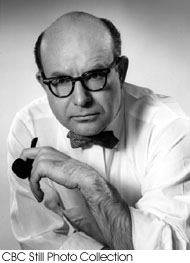
Year Born: 1919
Year Died: 2006
Pioneer
Moore, James Mavor (1919-2006)
Mavor Moore was born in Toronto, one of three sons of Francis John Moore, an Anglican theologian, and Dora Mavor Moore, actress, teacher and founder of the Village Players, the New Play Society and the NPS’s theatre school, and whose name was to be used for the annual Toronto Theatre Awards. His mother produced Mavor Moore’s first play, written when he was 12, for a girls’ dramatic club.
His first radio performance was in 1929 on CFCA Toronto as a member of a choir singing Christmas music. That was also the year his parents’ marriage broke up. Always needing money, by 14 he was acting in The Crusoe Boys, a daily radio serial. Two years later he was performing for the new Canadian Radio Broadcasting Commission.
In his 1994 autobiography Reinventing Myself, he wrote: “More than anything else, this early experience convinced me that the most exciting challenge in life is to break new ground.” He did that throughout his life as a playwright, actor, director, producer, composer, critic, poet, teacher, public servant and with a brief stint in Canadian military intelligence during the Second World War.
Mavor graduated with a BA from the University of Toronto in 1941 with a nomination for a Rhodes Scholarship, but not before failing a year because of his extracurricular activities. They included acting for the CBC but he also taught, started a career in radio playwriting, acted on the stage and tried theatrical management.
After graduating, he joined the CBC, but left to become an intelligence officer and in 1943 married Darwina Faessler, with whom he had four children. He served in London and in 1945 returned to the CBC in Montreal as a producer in the international service. After an aborted transfer to Vancouver, he quit his CBC staff position in 1946 and returned to Toronto to freelance in the booming radio industry, acting before the microphone with the great troupe that included Bernard Braden, Barbara Kelly, John Drainie, Budd Knapp, Alice Hill, Don Harron, Lloyd Bochner and others. He also wrote and directed documentaries for the United Nations, taught at Lorne Greene’s Academy of Radio Arts, worked without salary for his mother’s New Play Society, and in 1948 started to write plays again. At NPS he unveiled Spring Thaw, an annual satirical revue which became famous and outlasted the NPS.
While he was in New York for the United Nations in 1950, CBS offered him $500 a week to direct its Studio One series, an offer later boosted to $1,500. Television was about three years old in the U.S. and CBC’s CBLT Toronto was to be launched in 1952. Mavor turned down the CBS offer to accept $165 a week to become production chief for the coming CBC-TV.
At the age of 35 Mavor quit the CBC for the third and last time to return to freelancing, initially acting at Stratford. From 1955-60 he was executive television producer at the U.N., though that didn’t stop his myriad stage pursuits. He wrote the musical Sunshine Town as an adaptation of the humorous works of Stephen Leacock, and the libretti for Harry Somers’ opera Louis Riel and Louis Applebaum’s Erehwon. He was founding artistic director from 1964 – 68 of the annual Charlottetown Summer Festival which was started to encourage Canadian writers and performers.
He was founding chairman of the Canadian Theatre Centre and the Guild of Canadian Playwrights and founding director of the Charlottetown Festival and of the St. Lawrence Centre for the Arts in Toronto, which opened in 1970. From 1979 to 1983 he was the first professional artist to chair the Canada Council, the government body set up to support the arts. He wrote more than 100 plays and musicals for stage, radio and television. He wrote essays which appeared in Canada and internationally, and in 1958 became the first theatre critic at the now defunct Toronto Telegram. He wrote a monthly column on the arts for Maclean’s magazine, hosted a panel show, Crossfire, on CJOH-TV Ottawa and acted in about 60 films. His first marriage having ended under the strain of work, he remarried in 1968, his new wife being literary historian Phyllis Grosskurth. The marriage lasted until 1978 and in 1980 he married opera singer Alexandra Browning.
In 1970 Mavor had accepted a position teaching theatre history at York University. He left in 1984 as professor emeritus to have more time to write. He served on several other boards, wrote a weekly cultural column for the Globe and Mail, moved to Vancouver and hosted the World Conference on the Arts, Business and Politics for Expo 86, acted on more boards, and wrote and composed the music for his third adaptation of Dicken’s A Christmas Carol. The musical became a Canadian Christmas tradition. In 1990 he and Alexandra moved with their daughter to the University of Victoria where he became research professor, fine arts and humanities. He was also founding chair from 1996 – 68 of the British Columbia Arts Council.
Among his many awards: the Queen’s Medal, the Centennial Medal, a John Drainie Award, the 1982 Diplome d’honneur of the Canadian Conference of the Arts, the 1986 Molson prize, three international Peabody Awards, and honorary degrees from at least seven universities. In 1973 he was made an Officer of the Order of Canada and in 1988 a Companion; in 1999 he received a Governor General’s Award for lifetime achievement and the same year was elected to the Order of British Columbia.
Mavor Moore died in Victoria B.C. on December 18th 2006, at the age of 87.
Written by Jerry Fairbridge – February, 2003
